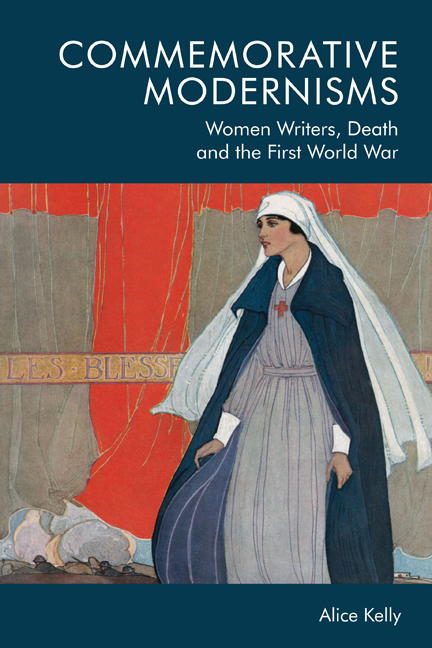Book contents
- Frontmatter
- Contents
- List of Figures
- Acknowledgements
- Dedication
- Introduction: A Culture Surcharged with Death
- Part One Death in Proximity: Wartime Commemorations
- Part Two Grief at a Distance: Civilian Modernisms
- Part Three Modernist Death: Postwar Remembrance
- Conclusion: Modernism’s Ghosts
- Bibliography
- Index
2 - Uncomfortable Propaganda: Edith Wharton’s Wartime Writings
Published online by Cambridge University Press: 15 October 2020
- Frontmatter
- Contents
- List of Figures
- Acknowledgements
- Dedication
- Introduction: A Culture Surcharged with Death
- Part One Death in Proximity: Wartime Commemorations
- Part Two Grief at a Distance: Civilian Modernisms
- Part Three Modernist Death: Postwar Remembrance
- Conclusion: Modernism’s Ghosts
- Bibliography
- Index
Summary
In her 1934 autobiography A Backward Glance, the American novelist Edith Wharton recounts an anecdote of a dinner in Paris one summer evening during the 1920s. She was taken by surprise when one of the other diners, Félix Raugel, tells her that they have met before:
I stared at him in wonder; and as he spoke the peaceful room vanished, and the twilight shadows of my suburban garden, and I saw myself, an eager grotesque figure, bestriding a mule in the long tight skirts of 1915, and suddenly appearing, a prosaic Walkyrie laden with cigarettes, in the heart of the mountain fastness held by the famous Chasseurs Alpins, already among the legendary troops of the French army. Seeing Félix Raugel again brought back to me with startling vividness the scenes of my repeated journeys to the front; the scarred torn land behind the trenches, the faces of the men who held it, the terrible and interminable epic of France's long defence.
The encounter makes her vividly recall her wartime meeting with Raugel during a visit to the Vosges in August 1915. Her description of herself as ‘an eager grotesque figure’ suggests her retrospective embarrassment at her fervour to see the front, while her self-portrait as a ‘prosaic Walkyrie’ emphasises her awareness of her highly unusual position as a woman in the war zones. In this passage, Wharton returns to tropes from Fighting France, her 1915 text that came out of these trips to the front: her memory of ‘the scarred torn land behind the trenches’ repeats the text's substitution of landscape for bodies and reveals the landscape's lasting hold on her imagination.
At the outbreak of the Great War, Wharton was living in France. She quickly became a highly active participant in relief efforts and an advocate for American intervention in the war in her fiction and non-fiction. Wharton's explicit war writings consist of a series of non-fiction impressions published as articles in Scribner's Magazine and The Saturday Evening Post, and collected as Fighting France in 1915; three short stories ‘Coming Home’ (1915), ‘Writing a War Story’ (1919), and ‘The Refugees’ (1919); the 1916 fundraising anthology The Book of the Homeless; and the novels The Marne (1918) and A Son at the Front (1923), as well as a number of poems, newspaper articles and talks.
- Type
- Chapter
- Information
- Commemorative ModernismsWomen Writers, Death and the First World War, pp. 81 - 118Publisher: Edinburgh University PressPrint publication year: 2020



